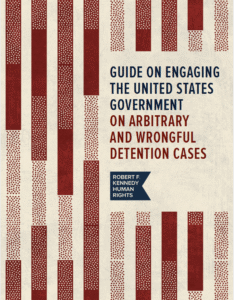In a forceful decision in favor of freedom of expression online, the United Nations Working Group on Arbitrary Detention this week determined that Stella Nyanzi—a prominent human rights defender, social activist, and academic in Uganda—was arbitrarily detained for her Facebook posts criticizing Uganda’s President Yoweri Museveni.
Read the full decision by the Working Group here.
Ugandan authorities arrested Nyanzi on April 7, 2017, and charged her with cyber harassment and offensive communication under the Computer Misuse Act of 2011. On April 24, 2017, Robert F. Kennedy Human Rights and Chapter Four Uganda jointly submitted a petition to the Working Group, arguing that Nyanzi’s detention was arbitrary and violated Uganda’s international human rights commitments. Nyanzi was released on bail on May 10, 2017, after more than four weeks in detention, but the criminal proceedings against her continue to this day.
Nyanzi’s next court appearance is scheduled for November 24, 2017. If convicted, she faces up to four years in prison for exercising her right to freedom of expression.
A leading voice on sexual freedom and women’s rights, Nyanzi has been fearless in speaking out against the Ugandan government’s misconduct. Before her arrest, Nyanzi criticized President Yoweri Museveni as well as First Lady and Minister of Education Janet Museveni for backtracking on an electoral promise to provide free sanitary pads to schoolgirls so they would not have to miss school.
Nyanzi launched a campaign in March 2017 to provide the pads herself, collecting thousands of dollars and gaining widespread public attention.
Nyanzi also expressed her frustration with the government through social media, and her Facebook posts, including one in which she referred to President Museveni as a “pair of buttocks,” formed the basis of the charges leveled against her.
The Working Group found that the Ugandan authorities’ reliance on the Computer Misuse Act was merely a “legal veneer” for Nyanzi’s unjustified detention. The Working Group emphasized that no one should be penalized for forms of expression that are merely considered insulting to a public figure.
Importantly, the Working Group noted that overly vague provisions of the Computer Misuse Act raise the potential for abuse by Ugandan authorities, fail to put people on notice about what conduct may be criminalized, and have a chilling effect on freedom of expression. The Working Group urged the government to bring the Computer Misuse Act into conformity with Uganda’s international human rights obligations.
The Working Group concluded that Nyanzi was arrested, detained, and charged without proper legal justification. She was not allowed to see her lawyer for 18 hours, and held for three nights without charge at a local police station before appearing in court on April 10, 2017. The Working Group concluded that the Ugandan government violated Nyanzi’s rights to due process, a fair trial, and the presumption of innocence.
Nyanzi was physically assaulted while in detention and denied sanitary pads, which the Working Group found amounted to torture or cruel, inhuman or degrading treatment. The Working Group also expressed concern that Ugandan authorities abused the psychiatric system. The prosecutor tried to have Nyanzi committed to a psychiatric hospital, which delayed the court’s consideration of her bail application. Staff from a government hospital attempted to conduct a forced medical exam on Nyanzi, without her consent or a court order. Nyanzi has since challenged, in the constitutional court, the legality of the Mental Treatment Act, the law under which the prosecutor sought to commit her to a psychiatric hospital. The case is yet to be heard.
Although the Working Group requested in May 2017 for the Ugandan government to provide information about Nyanzi’s arrest and detention, it has not done so. Uganda is expected to provide follow-up information within six months on its efforts to implement the Working Group’s recommendations to remedy the situation and provide reparations to Nyanzi for her inhuman treatment.




